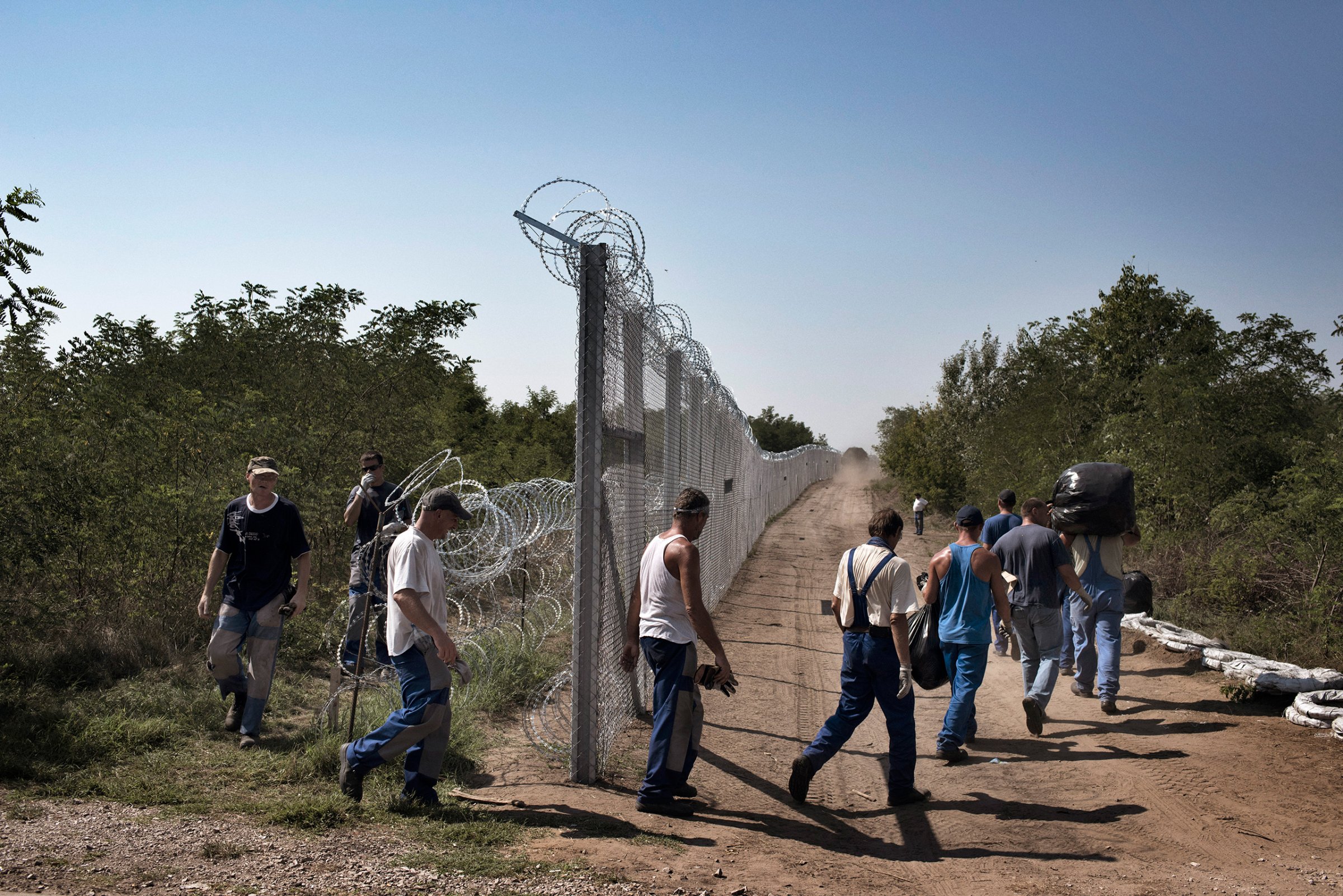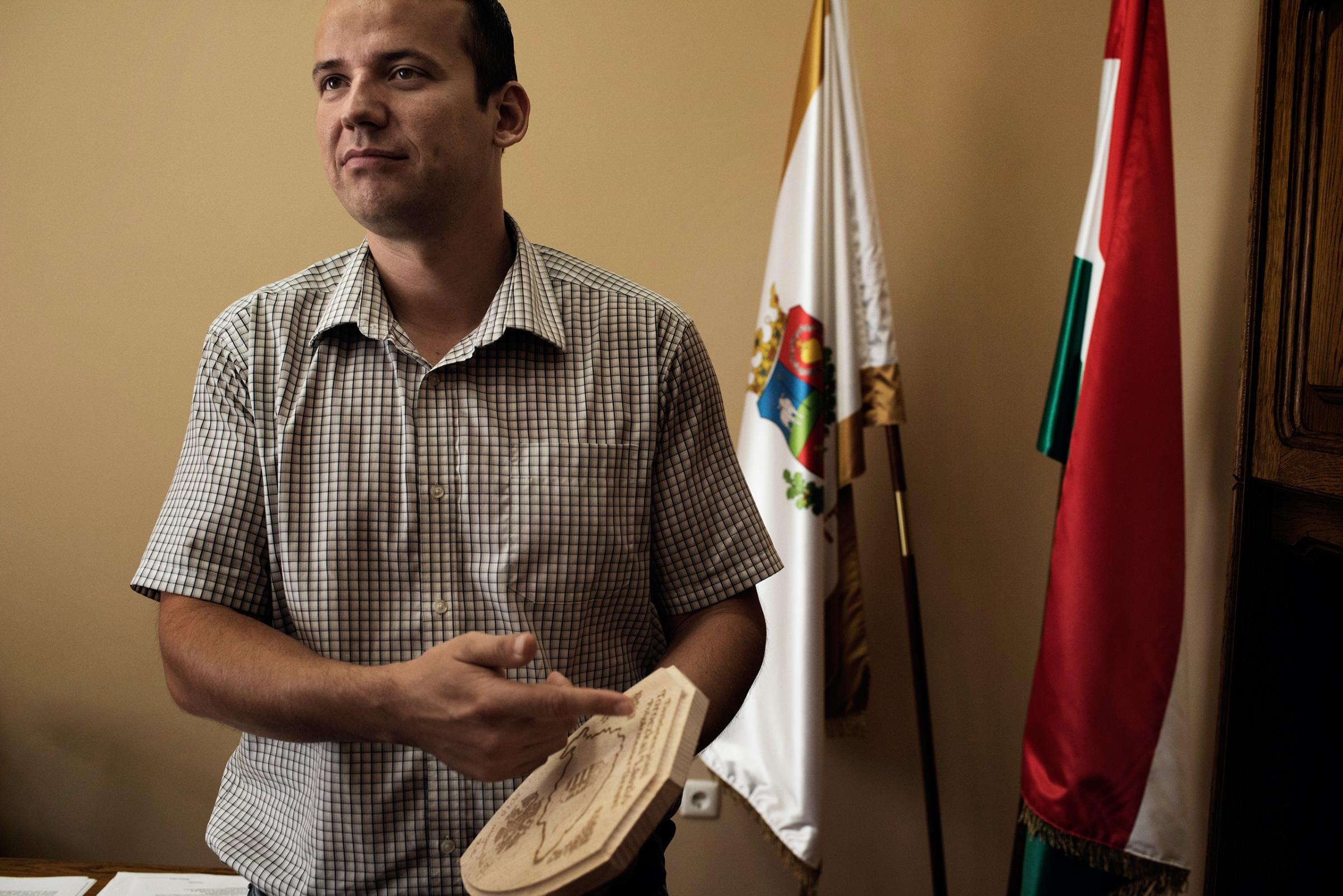
It’s been two weeks since Anna Kiss was summoned to a police station in Szeged, a city in southern Hungary, and asked to rat on her friends.
As she ardently tried to argue that a small town mayor shouldn’t be able to enforce a clear human rights violation, an officer began playing her a CCTV video showing a group of around 35 mainly young Hungarians. Standing somewhat awkwardly in protest on the side of a street in Ásotthalom, a small town close to the Serbian border, they were chanting out a call for “equal love.” Kiss was among them.
As his fingertip moved from face to face, Kiss refused to name anyone. “Of course I said I’m not only a witness but guilty of the same crime,” she recalls.
The group is being investigated under a town regulation banning “gay propaganda,” introduced by Ásotthalom’s far-right mayor László Toroczkai, who has also brought in a prohibition on mosque-building, burka wearing and the call to prayer.
He has said he wants the town of less than 5,000 to be a refuge for European Christians – “people who wouldn’t like to live in a multicultural society” – and is encouraging other regions in the country to follow their example. Toroczkai declined a request with TIME for an interview.
Though the town’s decrees are eventually expected to be struck down as unconstitutional by Hungary’s Supreme Court, they’ve already been in place since November.

Sitting in her apartment in Szeged, surrounded by rainbow flags and protest signs, 28-year-old Kiss holds up the message that was considered to be most offensive by the police. “Father + father + child = family,” it reads. “We have a version for lesbians too,” she adds.
Kiss is a community organizer with Szeged LMBT– a campaign group supporting LGBT rights. She said they decided to hold the protest on Dec. 10 – Human Rights Day – after the group received four Facebook messages from gay people living in Ásotthalom, all saying they weren’t openly gay but were scared.
For Kiss and her friend Alexandra – a 21-year-old student who asked to only be identified by her first name – this was their first ever demonstration. Other LGBT activists travelled the 120 miles from Budapest, and stayed just an hour in central Ásotthalom without any major problems, they said. “There was one incident where a car passed close to us and two guys shouted slurs from the car but they didn’t do anything,” Alexandra recalled. “There were also police a little way away watching.”
Kiss had written to the local authorities in advance informing them the protest would happen; that’s how they got her details to summon her for questioning on Feb. 15.
Now, she’s waiting to hear if she’ll be fined — the penalty for promoting gay propaganda is 150,000 Hungarian florint ($514), a month’s salary. She would welcome it, she says. “We want to be prosecuted. Then we can of course challenge it.”
Hungary has shifted to the right under Prime Minister Viktor Orbán, who has been extremely vocal against migration. The country has just announced it’s building a second fence along the Serbian border, and the government is proposing legislation which will mean asylum seekers are imprisoned indefinitely – something condemned by charities and human rights groups.
However, gay activists argue that other minorities living in the country are also being alienated. Last March, Hungary blocked a Europe-wide agreement aimed at tackling LGBT discrimination. Though introducing some limited improvements around freedom of assembly and the annual Budapest pride march, Orbán has also urged LGBT communities in Hungary not to exhibit overly “provocative behavior” which he suggested would run against their interests.
“He doesn’t outright say he hates all gay people but he has these more low key comments, like you can feel he’s not really supportive,” Alexandra reflected. “Not just in this sense but also in the sense of immigration and refugees it seems like being a decent person is a curse word.”
Tamás Dombos, from Háttér Society, one of Hungary’s oldest and largest LGBT charities, said the legal situation at the moment is “ambiguous” — which is what has allowed Ásotthalom to introduce its draconian and potentially illegal restrictions on what it calls “propaganda.”
In response to a request from TIME, a spokesperson from the Prime Minister’s office said though municipalities have the right to adopt local regulations, the government had ensured that mechanisms to protect the rights of LGBT people do exist.
Procedure is being followed, the spokesperson added, saying the local county had first asked Asotthalom to withdraw the regulation, and – when they didn’t – had made a submission to the Supreme Court who have the ability to annul it.
Lipot Holtzl, head of office at the Supreme Court, told TIME a petition was only lodged with them on Feb. 28 and a ruling could take up to 90 days. Björn van Roozendaal, programmes director at the International Lesbian, Gay, Bisexual, Trans and Intersex Association of Europe, said this lengthy, bureaucratic procedure clearly isn’t enough. “The national government is remaining silent and that is a very concerning – a signal of weakness from political leaders,” he said. “Silence is complicity.”
Meanwhile, Kiss and Alexandra wait. “Even if they don’t prosecute us and if the regulation stays, if someone else violates it and they don’t prosecute them (eventually) they will have to,” Alexandra says. “We violated it so they have to.”
More Must-Reads from TIME
- Cybersecurity Experts Are Sounding the Alarm on DOGE
- Meet the 2025 Women of the Year
- The Harsh Truth About Disability Inclusion
- Why Do More Young Adults Have Cancer?
- Colman Domingo Leads With Radical Love
- How to Get Better at Doing Things Alone
- Michelle Zauner Stares Down the Darkness
Contact us at letters@time.com